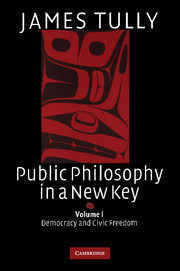
-
Select format
-
- Publisher:
- Cambridge University Press
- Publication date:
- September 2012
- December 2008
- ISBN:
- 9780511790737
- 9780521449618
- 9780521728799
- Dimensions:
- (228 x 152 mm)
- Weight & Pages:
- 0.73kg, 386 Pages
- Dimensions:
- (228 x 152 mm)
- Weight & Pages:
- 0.61kg, 388 Pages
- Subjects:
- Political Theory, History of Ideas, Politics and International Relations, Philosophy, Political Philosophy
- Series:
- Ideas in Context (93)
You may already have access via personal or institutional login- Subjects:
- Political Theory, History of Ideas, Politics and International Relations, Philosophy, Political Philosophy
- Series:
- Ideas in Context (93)
Book description
These two ambitious volumes from one of the world's most celebrated political philosophers present a new kind of political and legal theory that James Tully calls a public philosophy, and a complementary new way of thinking about active citizenship, called civic freedom. Professor Tully takes the reader step-by-step through the principal debates in political theory and the major types of political struggle today. These volumes represent a genuine landmark in political theory from the author of Strange Multiplicity, one of the most influential and distinctive commentaries on politics and the contemporary world published in recent years. This first volume of Public Philosophy in a New Key consists of a presentation and defence of a contextual approach to public philosophy and civic freedom, and then goes on to study specific struggles over recognition and distribution within states.
Reviews
'Overall, this is a rich and also timely work; it is historically erudite, analytically subtle and passionately engaged.'
Source: The Cambridge Law Journal
'Tully regards his political philosophy as a public philosophy, engaged in a constant dialogue with political agents. Where and how this dialogue takes place and which political effects it will have are questions beyond its control. The gap between theory and practice thus turns out to be a limit even for a theory that, as far as possible, conceives of itself as practice. Tully's work is exemplary in pushing this limit in ways from which both theory and practice can learn a great deal.'
Source: Constellations
Contents
Metrics
Altmetric attention score
Full text views
Full text views help Loading metrics...
Loading metrics...
* Views captured on Cambridge Core between #date#. This data will be updated every 24 hours.
Usage data cannot currently be displayed.
Accessibility standard: Unknown
Why this information is here
This section outlines the accessibility features of this content - including support for screen readers, full keyboard navigation and high-contrast display options. This may not be relevant for you.
Accessibility Information
Accessibility compliance for the PDF of this book is currently unknown and may be updated in the future.


